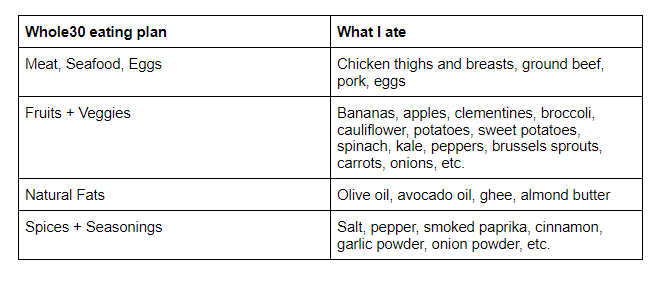My Experience with the Whole30 Diet
I like to start my year with the “new year, new me” mindset. After enjoying many delicious holiday treats, my sister, my mom and I decided to do the Whole30 together. As someone with a degree in nutrition and food science, I was interested to try it and see if it works. If you haven’t heard of it, Whole30 is a 30-day eating plan focused on the elimination of sugar, alcohol, grains, legumes, soy and dairy and is said to help improve overall health. According to research, these foods are often identified as causing inflammation in the body that can impact weight, blood sugar levels and general well being.
After eliminating these foods for 30 days did I notice improvements in my overall health? Yes. Was it easy? No. Is it bariatric-diet compliant? Yes, with a few modifications.
The Whole30 is about eliminating the foods that may cause inflammation in the body. Here is a break down of the types of foods I had to avoid while on the plan:
- Added sugar, real or artificial -- this includes maple syrup, honey, agave, stevia, Splenda and more.
- Alcohol of any kind
- Grains -- this includes wheat, rye, barley, oats, corn, rice, millet, quinoa, buckwheat and more
- Most forms of legumes -- this includes beans, peanuts and all forms of soy
- Dairy products
- Baked goods or treats, even if they were made with *approved* ingredients - consuming/making/buying Whole30 “approved” baked goods won’t allow for long-term habit changes
Here are the types of foods I could eat:

After 30 days was it worth it?
If you’re looking to reset your eating habits, curb your sweet tooth, and learn more about how your body reacts to certain foods this plan may be for you. Some of the benefits that I experienced included clearer skin and better digestion. I did continue to eat mostly grain, dairy and sugar free for a few weeks after the 30 days were over. For me, it was worth it. I was able to really learn how my body responds to certain foods like grains and dairy, I had more energy, I curbed my sweet tooth and I would absolutely do it again.
Whole30 and Bariatric Patients
The Whole30 approach to eating can be a good fit for bariatric patients, but with some modifications. Overall, the main food choices encouraged on Whole30 - unprocessed proteins, non-starchy vegetables and healthy fats - are a perfect fit for bariatric patients. It is important, however, to be realistic when planning meals and snacks since the monetary and time investment can prove quite challenging.
Since Whole30 discourages “liquid foods” such as protein shakes or smoothies, it is not recommended for bariatric patients who are less than 6 months out from surgery. While weight loss often occurs on this eating plan, it is not the sole focus. People who follow this eating plan are often looking to identify which foods their body can tolerate and digest well and which ones don’t as well as to consistently make healthier choices. It can, however, be a useful tool for bariatric patients who are trying to change their eating patterns, cut down on sugar and those looking to identify post-operative food sensitivities.
My Whole30 Experience
Week 1
The first few days were easy for me. They felt too easy. I already had experience meal prepping my food for work so the first week or so was all good. I did have to change a few habits like stopping at my favorite coffee shop for a latte before work. Other than that, I felt fine. My body felt more energized and I was definitely less lethargic.
Weeks 2-3
Here’s where it got tricky. I did not realize how much planning and prepping this eating plan was going to need. I spent a lot of time reading every label so carefully. It was eye opening to see how many everyday products have added sugar. Like those who have had bariatric surgery, not everyone I was surrounded by was also trying this eating plan. I did find myself saying no to eating out at restaurants or ordering takeout at times. I reminded myself I was fueling my body with real, non-processed, healthy foods and I felt really good about doing so. It became easier as the 30 days progressed. I explained more about the eating plan and why I was doing it to those around me. I was even able to get my friends and family to try some Whole30 approved recipes, and I considered continuing after the 30 day mark.
Weeks 3-4 Life got busy, and the final weeks flew by. Before I knew it, my 30 days were up. I felt a sense of accomplishment because I set my mind to it and completed it. All in all, it was a great way to start off the year. It reminded me what foods work well with my body and which ones don’t. The Whole30 helped me realize that I feel my best when I avoid dairy products and sugar. Now I’m a more mindful grocery shopper, I read the labels on my foods looking for hidden sugars and grains.
If you’re interested in learning more about the Whole30 diet, make an appointment to meet with your New Jersey Bariatric Center dietitian.
Sources:
Hartwig. (2021). What is the Whole30? Whole30 Diet. https://whole30.com/discover/

